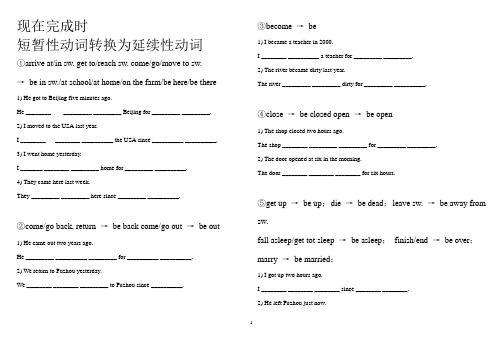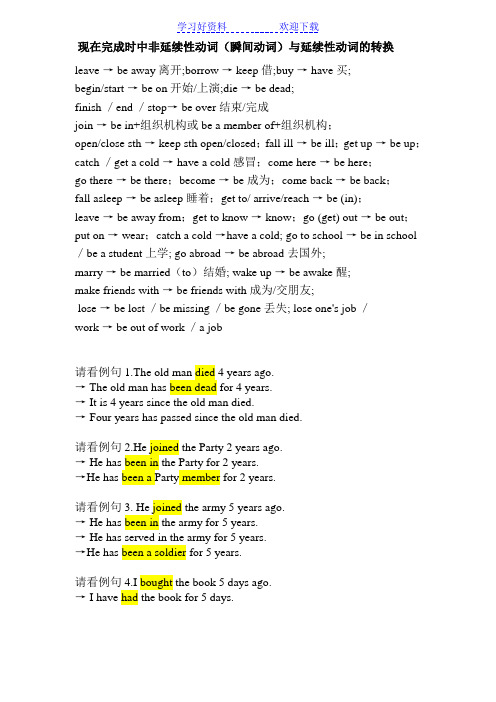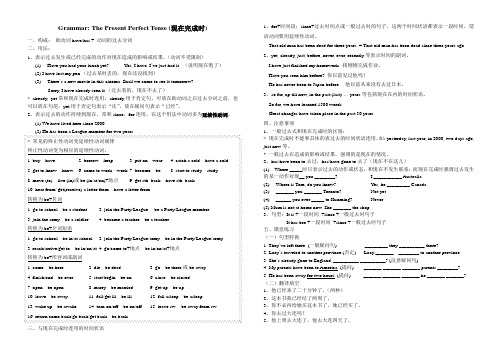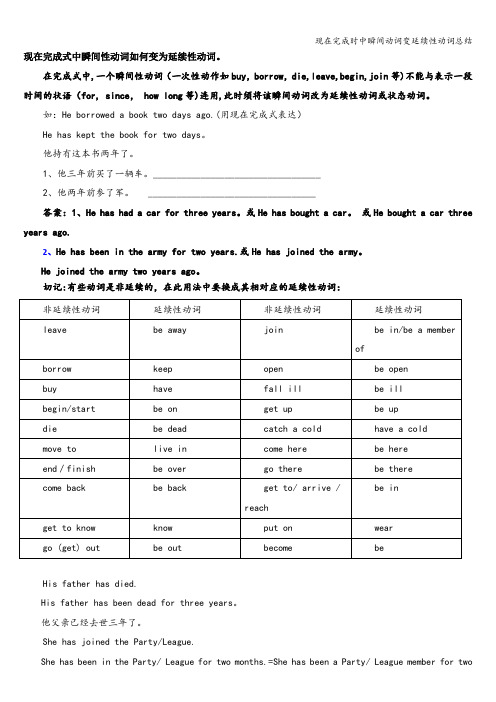现在完成时中常见短暂性动词变延续性动词
现在完成时延续性与暂短性动词用法

现在完成时(短暂性动词与延续性动词)的用法基本结构:主语+have/has+过去分词(done)①肯定句:主语+have/has+过去分词+其他②否定句:主语+have/has+not+过去分词+其他③一般疑问句:Have/Has+主语+过去分词+其他④特殊疑问句:特殊疑问词+一般疑问句(have/has+主语+过去分词+其他)(1)现在完成时用来表示现在之前已发生过或完成的动作或状态,但其结果却和现在有联系,也就是说,动作或状态发生在过去但它的影响现在还存在.I have spent all of my money.(含义是:现在我没有钱花了.)Jane has laid the table.(含义是:现在桌子已经摆好了.)Michael has been ill.(含义是:现在仍然很虚弱)He has returned from abroad. (含义是:现在已在此地)(2)现在完成时可以用来表示发生在过去某一时刻的,持续到现在的动作(用行为动词表示)或状态(be动词表示)常与for(+时间段),since(+时间点或过去时的句子)连用. Mary has been ill for three days.I have lived here since 1998.注(超重要):瞬间动词(buy,die,join,lose……)不能直接与for since 连用。
要改变动词come-be go out-be out finish-be over open-be opendie-be dead1.have代替buyMy brother has had(不能用has bought) this bike for almost four years.2、用keep或have代替borrowI have kept(不能用have borrowed) the book for quite a few days.3、用be替代becomeHow long has your sister been a teacher?4、用have a cold代替catch a coldTom has had a cold since the day before yesterday.5、用wear代替put onb)用“be+形容词”代终止性动词1、be+married代marry2、be+ill代fall (get) ill3、be+dead代die4、be+asleep代fall (get) asleep5、be+awake代wake/wake up6、be+gone代lose,die,sell,leave7、be+open代open 8、be closed代close/shut9、be+missing(gone,lost)代losec)用“be+副词”代终止性动词1“be+on”代start,begin2“be+up”代get up3“be+back(to)”代return to,come back to,go back to4“be here (there)”代come(arrive,reach,get) here或go (arrive,reach,get) there等等d)用“be+介词短语”代终止性动词1.“be in/at +地点”代替go to /come to2.用be in the army 代替join the army3.“be in/at +地点”代替move to常用瞬间动词变延续性动词表:1. have arrived at/in sw. got to/reached sw. come/gone/moved to sw.→have been in sw./at…相应的介词2. have come/gone back/returned → have been back3. have come/gone out →have b een out4. have become → have been5. have closed / opened→ have been close/open6. have got up → have been up;7. have died → have been dead;8. have left sw. → have been away from sw.9. have fallen asleep/got to sleep → have been asleep;10. have finished/ended/completed → have been over;11. Have married → have been married;12. have started/begun to do sth. → have done sth. ;13. have begun → have been on14. have borrowed/bought →have kept/had15. have lost → haven’t had16. have put on →have worn17. have caught /get a cold → have had a cold;18. have got to know → have known19. have/has gone to → have been in20. have joined/have taken part in the league/the Party/the army→have been a member of/ have been in/have been the Party’s member/the league member/the soldier…注意:1.现在完成时不能单独与准确时间连用,(如表示过去的时间状语)如yesterday(morning、afternoon),last(morning、afternoon)等,除非与for,since连用.2.现在完成时往往同表示不确定的过去时间状语连用,如already(肯定), yet(否定,疑问), just, before, recently,still, lately等:He has already obtained(得到\获得) a scholarship(奖学金).I haven't seen much of him recently (lately).We have seen that film before.Have they found the missing child yet ?3. 现在完成时常常与表示频度的时间状语连用,如often, sometimes, ever, never, twice等:Have you ever been to BeijingI have never heard Bunny say anything against her.I have used this pen only three times. It is still good.4. 现在完成时还往往可以同包括现在时间在内的时间状语连用,如now, these days/weeks/months/years, this morning/week/month/year, just, today, so far 等:Peter has written six papers so far.There has been too much rain in San Francisco this year.5.现在完成时的"完成用法"现在完成时的"完成用法"指的是动作发生在过去某一时刻并已结束,但该动作对现在产生了影响,与现在情况具有因果关系。
现在完成时延续性与暂短性动词用法

现在完成时延续性与暂短性动词用法编辑整理:尊敬的读者朋友们:这里是精品文档编辑中心,本文档内容是由我和我的同事精心编辑整理后发布的,发布之前我们对文中内容进行仔细校对,但是难免会有疏漏的地方,但是任然希望(现在完成时延续性与暂短性动词用法)的内容能够给您的工作和学习带来便利。
同时也真诚的希望收到您的建议和反馈,这将是我们进步的源泉,前进的动力。
本文可编辑可修改,如果觉得对您有帮助请收藏以便随时查阅,最后祝您生活愉快业绩进步,以下为现在完成时延续性与暂短性动词用法的全部内容。
现在完成时(短暂性动词与延续性动词)的用法基本结构:主语+have/has+过去分词(done)①肯定句:主语+have/has+过去分词+其他②否定句:主语+have/has+not+过去分词+其他③一般疑问句:Have/Has+主语+过去分词+其他④特殊疑问句:特殊疑问词+一般疑问句(have/has+主语+过去分词+其他)(1)现在完成时用来表示现在之前已发生过或完成的动作或状态,但其结果却和现在有联系,也就是说,动作或状态发生在过去但它的影响现在还存在.I have spent all of my money。
(含义是:现在我没有钱花了。
)Jane has laid the table。
(含义是:现在桌子已经摆好了.)Michael has been ill.(含义是:现在仍然很虚弱)He has returned from abroad. (含义是:现在已在此地)(2)现在完成时可以用来表示发生在过去某一时刻的,持续到现在的动作(用行为动词表示)或状态(be动词表示)常与for(+时间段),since(+时间点或过去时的句子)连用.Mary has been ill for three days.I have lived here since 1998.注(超重要):瞬间动词(buy,die,join,lose……)不能直接与for since 连用.要改变动词come-be go out—be out finish-be over open-be opendie—be dead1。
现在完成时延续性与暂短性动词用法

现在完成时(短暂性动词与延续性动词)的用法基本结构:主语+have/has+过去分词(done)①肯定句:主语+have/has+过去分词+其他②否定句:主语+have/has+not+过去分词+其他③一般疑问句:Have/Has+主语+过去分词+其他④特殊疑问句:特殊疑问词+一般疑问句(have/has+主语+过去分词+其他)(1))现在完成时用来表示现在之前已发生过或完成的动作或状态,但其结果却和现在有联系, 也就是说,动作或状态发生在过去但它的影响现在还存在.I have spent all of my money.(含义是:现在我没有钱花了.)Jane has laid the table.含( 义是:现在桌子已经摆好了.)Michael has been ill.(含义是:现在仍然很虚弱)He has returned from abroad. 含(义是:现在已在此地)(2)现在完成时可以用来表示发生在过去某一时刻的,持续到现在的动作(用行为动词表示)或状态(be 动词表示)常与for(+时间段),since(+时间点或过去时的句子)连用.Mary has been ill for three days.I have lived here since 1998.注(超重要):瞬间动词(buy,die,join,lose )不能直接与for since 连用。
要改变动词come-be go out-be out finish-be over open-be opendie-be dead1.have 代替buyMy brother has had(不能用has bought) this bike for almost four years.2、用keep或have 代替borrowI have kept(不能用have borrowed) the book for quite a few days.3、用be 替代becomeHow long has your sister been a teacher?4、用have a cold代替catch a coldTom has had a cold since the day before yesterday.5、用wear 代替put onb)用“b+e 形容词”代终止性动词1、be+married 代marry2、be+ill 代fall (get) ill3、be+dead代die4、be+asleep代fall (get) asleep5、be+awake代wake/wake up6、be+gone代lose,die,sell,leave7、be+open 代open8、be closed代close/shut9、be+missing(gone,lost)代losec)用“b+e 副词”代终止性动词1“b+e 2“b+e on”代start,begin up”代get up3“b+e back(to) 代”return to,come back to,go back to4“be here (there代) co”m e(arrive,reach,get) here或go (arrive,reach,get) there等等d)用“b+e 介词短语”代终止性动词1. “be in/at地+点”代替go to /come to2.用be in the army 代替join the army3. “be in/at地+点”代替move to常用瞬间动词变延续性动词表:1. have arrived at/in sw. got to/reached sw. come/gone/moved to sw.→have been in sw./at 相应的介词2. have come/gone back/returned → have been back3. have come/gone out →h e a e v n e o b u t4. have become → have been5. have closed / opened → have been close/open6. have got up →have be;e n up7. have died →have been;dead8. have left sw. → have been away from sw.9. have fallen asleep/got to sleep →have;been asleep10. have finished/ended/completed →have b;een over11. Have married →have been ma;rried12. have started/begun to do sth. →have;done sth.13. have begun → have been on14. have borrowed/bought →have kept/had15. have lost → haven ’t had16. have put on →have worn17. have caught /get a cold →have h;ad a cold18. have got to know → have known19. have/has gone to → have been in20. have joined/have taken part in the league/the Party/the army→have been a member of/ have been in/havbeeen the Party ’s member/the league member/the soldier注意: 1.现在完成时不能单独与准确时间连用,(如表示过去的时间状语)如yesterday(morning、afternoon),last(morning、afternoon)等,除非与for,since 连用.2.现在完成时往往同表示不确定的过去时间状语连用,如already(肯定), yet(否定,疑问), just, before, recently,still, lately 等:He has already obtained得(到获得) a scholarship(奖学金).I haven't seen much of him recently (lately).We have seen that film before.Have they found the missing child yet ?3. 现在完成时常常与表示频度的时间状语连用,如often, sometimes, ever, never, twice等:Have you ever been to BeijingI have never heard Bunny say anything against her.I have used this pen only three times. It is still good.4. 现在完成时还往往可以同包括现在时间在内的时间状语连用,如now, these days/weeks/months/years, this morning/week/month/year, just, today, so f a等r : Peter has written six papers so far.There has been too much rain in San Francisco this year.5. 现在完成时的" 完成用法"现在完成时的" 完成用法" 指的是动作发生在过去某一时刻并已结束,但该动作对现在产生了影响,与现在情况具有因果关系。
修改名词:现在完成时练习(短暂性动词与延续性动词的转换)

修改名词:现在完成时练习(短暂性动词与延续性动词的转换)现在完成时是英语语法中一种重要的时态,用于表示发生在过去但与现在有关的动作或经验。
在构成现在完成时的句子中,我们经常需要使用动词的现在分词形式。
然而,对于一些动词,我们需要将其转换为名词形式。
短暂性动词的转换短暂性动词是指表示短暂或瞬间动作的动词,这些动作不具有持续性。
在现在完成时句子中,我们需要将短暂性动词转换为名词形式。
举个例子:- 原始句子:He drank a cup of coffee.- 转换后的句子:He has had a cup of coffee.在这个例子中,我们将短暂性动词"drank"转换为名词形式"had"。
以下是一些常见的短暂性动词及其对应的转换形式:- bring -> have brought- eat -> have eaten- see -> have seen- take -> have taken- buy -> have bought延续性动词的转换延续性动词是指表示持续性或进行性动作的动词,这些动作具有一定的时间跨度。
在现在完成时句子中,我们需要将延续性动词转换为名词形式。
举个例子:- 原始句子:She has been reading a book.- 转换后的句子:She has had a book.在这个例子中,我们将延续性动词"reading"转换为名词形式"had"。
以下是一些常见的延续性动词及其对应的转换形式:- read -> have had- write -> have written- study -> have studied- work -> have worked- play -> have played通过将短暂性动词和延续性动词转换为名词形式,我们可以更准确地表达现在完成时的动作或经验。
初中英语短暂性动词转换为延续性动词

现在完成时短暂性动词转换为延续性动词①arrive at/in sw. get to/reach sw. come/go/move to sw.→be in sw./at school/at home/on the farm/be here/be there 1) He got to Beijing five minutes ago.He ________ _________ _________ Beijing for _________ _________.2) I moved to the USA last year.I ________ ________ __________ the USA since __________ __________.3) I went home yesterday.I _______ ________ _________ home for _________ __________.4) They came here last week.They _________ _________ here since _________ __________.②come/go back, return →be back come/go out →be out1) He came out two years ago.He _________ __________ _________ for __________ __________.2) We return to Fuzhou yesterday.We ________ ________ _________ to Fuzhou since __________. ③become →be1) I became a teacher in 2000.I ________ __________ a teacher for _________ _________.2) The river became dirty last year.The river _________ _________ dirty for _________ __________.④close →be closed open →be open1) The shop closed two hours ago.The shop ________ _________ _________ for _________ _________.2) The door opened at six in the morning.The door ________ ________ ________ for six hours.⑤get up →be up;die →be dead;leave sw. →be away from sw.fall asleep/get tot sleep →be asleep;finish/end →be over;marry →be married;1) I got up two hours ago.I ________ ________ ________ since ________ ________.2) He left Fuzhou just now.He _______ ________ ________ _________ Fuzhou for five minutes.3) My grandpa died in 2002.My grandpa _______ _______ ________for _______ ________.4) The meeting finished at six.The meeting ________ ______ ______ for six hours.5) I got to sleep two hours ago.I ________ _________ _________ since _________ _________.6) They married in 1990.They ________ _________ __________since _________.⑥start/begin to do sth. →do sth. ;begin →be on1) I began to teach at this school in 1995.I ____ ____ at this school since ____.2) The film began two minutes ago.The film ____ ____ ____ for ____ ____.⑦borrow →keep;lose →not have ;buy →have ;put on →wearcatch/get a cold →have a cold;get to know →know1) They borrowed it last week.They _________ _________ it since __________ __________. 2) I bought a pen two hours ago.I _________ _________ a pen for ________ __________.3) I got to know him last year.I _______ _______ him since __________ __________.4) I put on my glasses three years ago.I __________ __________ my glasses for _________ _________.⑧have/has gone to →have been inHe has gone to Beijing.He ____ ____ _____ Beijing for two days.⑨join the league/the Party/the army→be a league/a Party member/a soldier→be a member of the league/the Party→be in the league/the Party/the army1) He joined the league in 2002.He ________ _________ a _________ _________ for two years.He _______ _________ a __________ ___________ the __________ for two years. He ____________ ___________ ___________ the league for two years.2) My brother joined the army two years ago.My brother ________ __________ a ___________ for ___________ ___________. My brother __________ ___________ in ____________ ___________ for two years.。
现在完成时中非延续性动词(瞬间动词)与延续性动词的转换

现在完成时中非延续性动词(瞬间动词)与延续性动词的转换leave → be away离开;borrow → keep借;buy → have买;begin/start → be on开始/上演;die → be dead;finish /end /stop→ be over结束/完成join → be in+组织机构或be a member of+组织机构;open/close sth → keep sth open/closed;fall ill → be ill;get up → be up;catch /get a cold → have a cold感冒;come here → be here;go there → be there;become → be成为;come back → be back;fall asleep → be asleep睡着;get to/ arrive/reach → be (in);leave → be away from;get to know → know;go (get) out → be out;put on → wear;catch a cold →have a cold; go to school → be in school /be a student上学; go abroad → be abroad去国外;marry → be married(to)结婚; wake up → be awake 醒;make friends with → be friends with成为/交朋友;lose → be lost /be missing /be gone 丢失; lose one's job /work → be out of work /a job请看例句1.The old man died 4 years ago.→ The old man has been dead for 4 years.→ It is 4 years since the old man died.→ Four years has passed since the old man died.请看例句2.He joined the Party 2 years ago.→ He has been in the Party for 2 years.→He has been a Party member for 2 years.请看例句3. He joined the army 5 years ago.→ He has been in the army for 5 years.→ He has served in the army for 5 years.→He has been a soldier for 5 years.请看例句4.I bought the book 5 days ago.→ I have had the book for 5 days.。
现在完成时及常见的终止性动词变延续性动词规律

Grammar: The Present Perfect Tense (现在完成时)一、构成: 助动词have/has + 动词的过去分词 二、用法:1、表示过去发生或已经完成的动作对现在造成的影响或结果。
(动词不受限制) (1) ---Have you had your lunch yet? ---Yes, I have. I ’ve just had it. (说明现在饱了) (2) I have lost my pen.(过去某时丢的,现在还没找到)(3) ---There ’s a new movie in this cinema. Shall we come to see it tomorrow? ---Sorry, I have already seen it.(过去看的,现在不去了)* already, yet 常和现在完成时连用,already 用于肯定句,可放在助动词之后过去分词之前,也可以放在句尾;yet 用于否定句表示“还”,放在疑问句表示“已经”。
2、表示过去的动作持续到现在,常和since ,for 连用,在这个用法中动词多为延续性动词。
(1) We have lived here since 2000.(2) He has been a League member for two years. * 常见的终止性动词变延续性动词规律 终止性动词变为相应的延续性动词。
1. buy---have2. borrow---keep3. put on---wear4. catch a cold---have a cold5. get to know---know6. come to work---work7. become---be8. start to study---study8. move (to)---live (in)或be (in/at/on)+地点9. get sth. back---have sth. back10. hear from/ get(receive) a letter from---have a letter from 转换为be+名词1. go to school---be a student2. join the Party/League ---be a Party/League member3. join the army---be a soldier4. become a teacher---be a teacher转换为be+介词短语 1. go to school---be in/at school2. join the Party/League/army---be in the Party/League/army3. reach/arrive/get to---be in/on/at4. go/come to+地点---be in/on/at+地点 转换为be+形容词或副词 1. come---be here2. die---be dead3. go---be there 或be away4. finish/end---be over5. start/begin---be on6. close---be closed7. open---be open8. marry---be married9. get up---be up10. leave---be away11. fall/get ill---be ill12. fall asleep---be asleep13. wake up---be awake 14. turn on/off---be on/off 15. leave sw.---be away from sw.16. return/come back/go back/get back---be back 三、与现在完成时连用的时间状语1、for+时间段;since+过去时间点或一般过去时的句子。
现在完成时中瞬间动词变延续性动词总结

现在完成式中瞬间性动词如何变为延续性动词。
在完成式中,一个瞬间性动词(一次性动作如buy,borrow,die,leave,begin,join等)不能与表示一段时间的状语(for, since, how long等)连用,此时须将该瞬间动词改为延续性动词或状态动词。
如:He borrowed a book two days ago.(用现在完成式表达)He has kept the book for two days。
他持有这本书两年了。
1、他三年前买了一辆车。
___________________________________2、他两年前参了军。
___________________________________答案:1、He has had a car for three years。
或He has bought a car。
或He bought a car three years ago.2、He has been in the army for two years.或He has joined the army。
He joined the army two years ago。
切记:有些动词是非延续的,在此用法中要换成其相对应的延续性动词:His father has died.His father has been dead for three years。
他父亲已经去世三年了。
She has joined the Party/League.She has been in the Party/ League for two months.=She has been a Party/ League member for twomonths。
他已经入党/团两个月了。
The film has started/begun.The film has been on/ lasted since 5 minutes ago.电影已经开始5分钟了。
